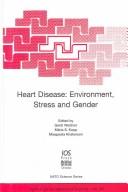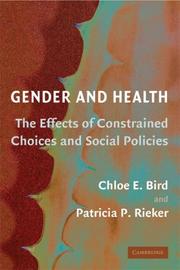| Listing 1 - 10 of 12 | << page >> |
Sort by
|
Book
Abstract | Keywords | Export | Availability | Bookmark
 Loading...
Loading...Choose an application
- Reference Manager
- EndNote
- RefWorks (Direct export to RefWorks)
Differenciation sexuelle --- Maladies --- Facteurs sexuels --- Differenciation sexuelle --- Maladies --- Facteurs sexuels
Book
ISBN: 9780367446079 Year: 2019 Publisher: Boca Raton, FL : CRC Press
Abstract | Keywords | Export | Availability | Bookmark
 Loading...
Loading...Choose an application
- Reference Manager
- EndNote
- RefWorks (Direct export to RefWorks)
This Third Edition of Men’s Health provides a comprehensive and authoritative reference source to urologists, andrologists, family practitioners, and all professionals dealing with the male patient who diagnose and treat males with a variety of health problems, such as prostate cancer, male osteoporosis, and testicular cancer. The new edition been completely reorganized into disease- and problem-based sections, to highlight important topics such as cancer and premature cardiovascular disease. There is also new material on some of the less frequently explored areas of men's health, such as Tourette's Syndrome, depression, and cosmetic surgery.
Men's Health. --- Sex Factors. --- Maladies --- Hommes --- Hommes --- Facteurs sexuels --- Santé et hygiène --- Maladies.
Book
ISBN: 9780857298324 9780857298317 Year: 2012 Publisher: London Springer London
Abstract | Keywords | Export | Availability | Bookmark
 Loading...
Loading...Choose an application
- Reference Manager
- EndNote
- RefWorks (Direct export to RefWorks)
Prior to 2000, gender medicine was not a popular term, but in the past 10 years and analogous to the growth in the need to consider Personalised Medicine, it has become hugely important to understand that women are not small men . There is no more doubt that clinical manifestations of prevalent diseases differ in women and men and this is at least partially due to sex differences in pathophysiology. While the majority of diagnostic and therapeutic strategies were aimed at males 30 years ago, endocrine and reproductive systems were the logical areas for the observation of the effects of gender on medicine. It has been know for some time that women and men also differ in diseases such as diabetes and various cardiovascular syndromes, which has pushed research in these directions. Nevertheless, it is still a challenge to define gender medicine clearly, since it is characterized by an unbiased comparison between women and men and the inclusion of gender as a sociocultural process into medical hypotheses. It includes the recognition of biological differences among women and men, i.e. sex differences, but goes well beyond this. Sex and Gender Aspects in Clinical Medicine defines the concepts and practical clinical meaning of gender medicine. As such it is a highly complex yet hugely important reference for all professional medical personnel, from clinicians in cardiology, endocrinology, oncology, reproductive medicine, diabetology, rheumatology, plus also a number of specialists who deal with pharmacotherapy, pathophysiology, genomics, as well as researchers investigating any of the above disciplines. Many medical authors use gender as an inclusive term that can include the biological notion of sex as well as the sociocultural notion of gender. In this book, the Editors use sex and gender in their more stringent sense. If a clear distinction is not possible gender is used in a broader sense to include biological phenomena The US Institute of Medicine declared in its 2001 and 2010 statements that being a woman or being a man significantly influences the course of diseases. Gender medicine aims at better management and treatment of both women and men, and this book is an ideal reference for anyone wanting to understand the intricate relationship between gender and health.
geneeskunde --- Human medicine --- Clinical Medicine --- Men's Health. --- Sex Factors. --- Women's Health. --- Clinical medicine. --- Sex factors in disease --- Médecine clinique --- Maladies --- methods. --- Facteurs sexuels --- EPUB-LIV-FT LIVMEDEC SPRINGER-B

ISBN: 9789042011762 9042011769 9789042011861 9042011866 9004333592 Year: 2003 Publisher: Brill
Abstract | Keywords | Export | Availability | Bookmark
 Loading...
Loading...Choose an application
- Reference Manager
- EndNote
- RefWorks (Direct export to RefWorks)
This innovative collection of essays employs historical and sociological approaches to provide important case studies of asylums, psychiatry and mental illness in England, Wales, Scotland and Ireland. Leading scholars in the field working on a variety of geographical, temporal, socio-cultural, economic and political contexts, show how class and gender have historically affected and conditioned the thinking, language, and processes according to which society identified and responded to the mentally illustrations Contributors to this volume focus on both class and gender and thus are able to explore their interaction, whereas previous publications addressed class or gender incidentally, partially, or in isolation. By adopting this dual focus as its unifying theme, the volume is able to supply new insights into such interesting topics as patient careers, the relationship between lay and professional knowledge of insanity, the boundaries of professional power, and the creation of psychiatric knowledge. Particularly useful to student readers (and to those new to this academic field) is a substantive and accessible introduction to existing scholarship in the field, which signposts the ways in which this collection challenges, adjusts and extends previous perspectives.
Sex differences (Psychology) --- Mental illness --- Social psychiatry --- Mental health policy --- Différences entre sexes (Psychologie) --- Maladies mentales --- Psychiatrie sociale --- Santé mentale --- History --- Sex factors --- Social aspects --- Histoire --- Facteurs sexuels --- Politique gouvernementale --- Aspect social --- Sex (Psychology)
Periodical
ISSN: 15508579 Publisher: Place of publication unknown
Abstract | Keywords | Export | Availability | Bookmark
 Loading...
Loading...Choose an application
- Reference Manager
- EndNote
- RefWorks (Direct export to RefWorks)
Human medicine --- Medicine --- Sex Factors --- Women's Health --- Sex factors in disease --- Women --- Maladies --- Femmes --- Periodicals. --- Health and hygiene --- Facteurs sexuels --- Périodiques --- Santé et hygiène --- Medicine. --- Women's Health. --- Sex Factors. --- Sex factors in disease. --- Différence selon le sexe. --- Médecine. --- Physiologie humaine. --- Health and hygiene. --- Health Sciences --- Life Sciences --- General and Others --- Pathology --- Genetics --- Immunology --- gender
Periodical
ISSN: 15579891 15579883
Abstract | Keywords | Export | Availability | Bookmark
 Loading...
Loading...Choose an application
- Reference Manager
- EndNote
- RefWorks (Direct export to RefWorks)
Men --- Sex factors in disease --- Hommes --- Maladies --- Sex factors in disease. --- Health and hygiene --- Diseases --- Santé et hygiène --- Facteurs sexuels --- Diseases. --- Health and hygiene. --- Health Sciences --- Public health --- Human males --- Sex differences --- Sex factors --- Health. --- Men. --- Sex Factors. --- Factor, Sex --- Factors, Sex --- Sex Factor --- Boys --- men's health --- male specific diseases --- male health issues --- masculinity --- Pathology --- Andrology --- Human beings --- Males --- Effeminacy --- Masculinity --- Human medicine

ISSN: 15667693 ISBN: 1586030825 4274905071 0585458936 9780585458939 9781586030827 Year: 2002 Volume: v. 327 Publisher: Amsterdam Washington, DC IOS Press
Abstract | Keywords | Export | Availability | Bookmark
 Loading...
Loading...Choose an application
- Reference Manager
- EndNote
- RefWorks (Direct export to RefWorks)
Coeur --- Appareil cardiovasculaire --- Maladies --- etiologie --- étiologie --- Coronary Disease --- Environmental Health --- Exertion --- Sex Factors --- Stress, Psychological --- Coronary heart disease --- Stress (Physiology) --- Environmental health --- Artères coronaires --- Stress --- Hygiène du milieu --- complications --- Congresses --- Congresses. --- Sex factors --- Congrès --- Facteurs sexuels --- etiologie. --- étiologie.

ISBN: 9780521682800 0521864151 9780521864152 0521682800 9780511807305 110717838X 9786611254551 0511387695 0511386702 0511383029 0511807309 128125455X 0511384874 0511388705 Year: 2008 Publisher: Cambridge ; New York : Cambridge University Press,
Abstract | Keywords | Export | Availability | Bookmark
 Loading...
Loading...Choose an application
- Reference Manager
- EndNote
- RefWorks (Direct export to RefWorks)
Chloe Bird and Patricia Rieker argue that to improve men's and women's health, individuals, researchers, and policymakers must understand the social and biological sources of the perplexing gender differences in illness and longevity. Although individuals are increasingly aware of what they should do to improve health, competing demands for time, money, and attention discourage or prevent healthy behavior. Drawing on research and cross-national examples of family, work, community, and government policies, the authors develop a model of constrained choice that addresses how decisions and actions at each of these levels shape men's and women's health-related opportunities. Understanding the cumulative impact of their choices can inform individuals at each of these levels how to better integrate health implications into their everyday decisions and actions. Their platform for prevention calls for a radical reorientation of health science and policy to help individuals pursue health and to lower the barriers that may discourage that pursuit.
Sex factors in disease. --- Health --- Medical policy. --- Maladies --- Santé --- Politique sanitaire --- Sex differences. --- Facteurs sexuels --- Différences entre sexes --- Sex Factors. --- Gender Identity. --- Health Behavior. --- Public Policy. --- #SBIB:316.334.3M20 --- #SBIB:316.346H29 --- Sociale epidemiologie en etiologie: sociale aspecten van ziekte en gezondheid --- Positie van de vrouw in de samenleving: andere topics --- Public policy. --- Santé --- Différences entre sexes --- Medical policy --- Sex factors in disease --- Diseases --- Pathology --- Sex differences --- Health care policy --- Health policy --- Medical care --- Medicine and state --- Policy, Medical --- Public health --- Public health policy --- State and medicine --- Science and state --- Social policy --- Personal health --- Wellness --- Medicine --- Physiology --- Holistic medicine --- Hygiene --- Well-being --- Sex factors --- Government policy --- Social Sciences --- Sociology
Periodical
ISSN: 18787398 15508579 Year: 2004 Publisher: [Amsterdam] ; [New York] : Elsevier Science,
Abstract | Keywords | Export | Availability | Bookmark
 Loading...
Loading...Choose an application
- Reference Manager
- EndNote
- RefWorks (Direct export to RefWorks)
Sex factors in disease --- Women --- Medicine --- Sex Factors --- Health and hygiene --- Maladies --- Femmes --- Sex factors in disease. --- Différence selon le sexe. --- Médecine. --- Physiologie humaine. --- Women's Health. --- Facteurs sexuels --- Santé et hygiène --- Health and hygiene. --- Woman's Health --- Womens Health --- Health, Woman's --- Health, Women's --- Health, Womens --- Health of women --- Diseases --- Hygiene --- Sex differences --- Sex factors --- Health education of women --- Pathology --- Medicine. --- Sex Factors. --- Factor, Sex --- Factors, Sex --- Sex Factor --- Medical Specialities --- Medical Specialties --- Medical Specialty --- Specialities, Medical --- Specialties, Medical --- Specialty, Medical --- Medical Speciality --- Speciality, Medical --- Health Workforce
Book
ISBN: 2234091268 9782234091269 Year: 2023 Publisher: Paris : Stock,
Abstract | Keywords | Export | Availability | Bookmark
 Loading...
Loading...Choose an application
- Reference Manager
- EndNote
- RefWorks (Direct export to RefWorks)
Vous en avez probablement au fond de votre trousse à pharmacie. Le Spasfon est l'un des médicaments les plus prescrits et vendus en France, en majorité aux femmes. Une pilule rose familière lorsque l'on souffre de règles douloureuses. Et pourtant, aucun essai clinique ne soutient son efficacité pour cette indication.Juliette Ferry-Danini retourne aux origines du médicament, dans les années 1960. L'histoire du Spasfon n'est pas toute rose : des malades empoisonnés à dessein, des données scientifiques défaillantes et le sexisme ont marqué son développement, construisant une situation d'ignorance scientifique qui perdure aujourd'hui.Dans cet essai de philosophie féministe, l'autrice analyse les conséquences de cette ignorance en médecine et propose des outils essentiels pour redonner du pouvoir et de l'autonomie aux patientes et patients.
Drug-Related Side Effects and Adverse Reactions. --- Menstruation Disturbances --- Clinical Trials as Topic. --- Parasympatholytics --- Troubles de la menstruation --- Essais cliniques des médicaments --- Phloroglucinol --- Consentement éclairé (droit médical) --- Médicaments --- Troubles de la menstruation. --- Parasympatholytiques. --- Effets secondaires indésirables des médicaments. --- therapy. --- adverse effects. --- Thérapeutique --- Complications (médecine) --- Emploi en thérapeutique --- Essais. --- Efficacité. --- Effets secondaires. --- Histoire. --- Philosophy, Medical. --- Quality of Health Care. --- Women's Health. --- Sex Factors. --- Feminism. --- Essais cliniques des médicaments. --- Essais cliniques des médicaments --- Consentement éclairé (droit médical) --- Médicaments --- Philosophie médicale. --- Médecine --- Qualité des soins de santé. --- Santé des femmes. --- Féminisme. --- Facteurs sexuels. --- Philosophie --- Drugs --- Informed consent (Medical law)
| Listing 1 - 10 of 12 | << page >> |
Sort by
|

 Search
Search Feedback
Feedback About UniCat
About UniCat  Help
Help News
News